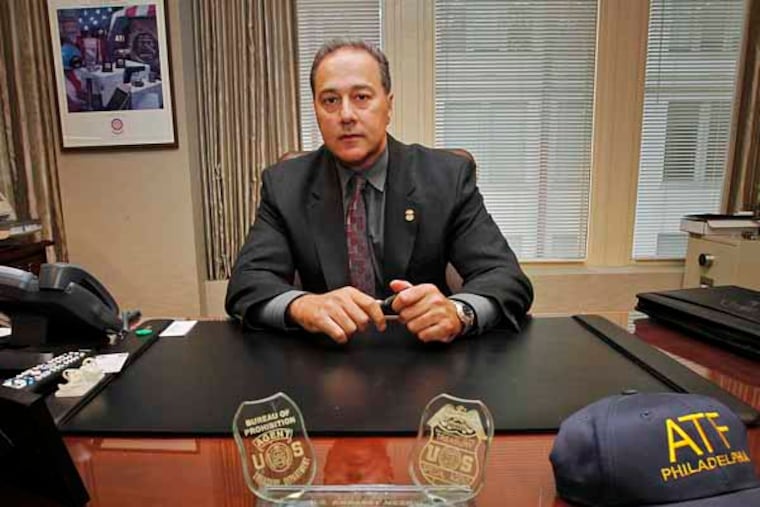ATF's new Philadelphia chief aims at illegal guns
Essam "Sam" Rabadi had worked only a few years for the Bureau of Alcohol, Tobacco, and Firearms in the 1990s when he caught a made-for-TV kind of case.

Essam "Sam" Rabadi had worked only a few years for the Bureau of Alcohol, Tobacco, and Firearms in the 1990s when he caught a made-for-TV kind of case.
Four teens had shot and paralyzed a Brooklyn jeweler in a $200,000 smash-and-grab heist. But they were sloppy, leaving a gun in a car blocks from the scene.
Rabadi and a New York City detective traced the gun to its buyer, a McDonald's manager in Baltimore. After hours of questioning, the manager caved and gave up David Gregory, to whom he had passed the gun.
Gregory, investigators learned, was a criminal maestro, recruiting teens in Baltimore and New York and dispatching them to commit robberies in the two cities, then trading the loot for heroin. Rabadi and his partner eventually linked the crews to more than 30 heists, arrested 17 defendants, and saw many sent to prison for decades.
In the years since, Rabadi climbed the ATF ladder, and this month, he settled in as head of the bureau's Philadelphia division, its fifth largest. The tools have changed, but the job - stemming the flow of illegal guns and catching criminals who use them - is as daunting as ever.
Since 2008, law enforcement agencies have recovered an average of 4,300 guns a year in Philadelphia. In 2011, the most recent year for which data were available, more illegal guns were seized here than in New York City.
"The No. 1 issue in this city is the proliferation of illegal handguns and the violence attached to that," Rabadi, 51, said in an interview at the ATF office across from Independence Hall. "The level of gun violence here, it's fairly remarkable."
So remarkable that last summer, federal agencies and Philadelphia police launched an unprecedented crackdown. For 120 days in round-the-clock shifts, they poured officers and agents into six high-crime districts, targeting known offenders.
The ATF brought in dozens of agents from other divisions to help in what it called the "surge."
Rabadi was a commander, but he often hit the streets with his agents, First Assistant U.S. Attorney Louis Lappen recalled. He also persuaded police to assign some of their best officers, despite reluctance among department brass, Deputy Police Commissioner Tom Wright said.
By fall, officials had nearly 100 people in custody, and 77 federal indictments. The violent crime rate in four of the six districts had dropped from the same span in the previous year.
According to Wright, the surge strengthened relationships between police and federal counterparts. "The partnership has been phenomenal," he said.
Budget cuts on all levels make another surge unlikely anytime soon. With about 80 agents and 170 total staff in offices from Philadelphia to Pittsburgh, the ATF division already has fewer bodies than it did a decade ago, even as some believe tighter gun control in neighboring states has made Pennsylvania more appealing to illegal gun traffickers.
Rabadi said he hoped to increase the use of a national ballistics database that helps agents and officers identify guns used in crimes. He sees that as a way to home in on the worst offenders, a small minority he thinks are responsible for an outsize proportion of gun violence. He says he'll also shift agents to a squad focused on the city's most crime-ridden areas.
"We don't quite have the numbers that we did [in the surge], but we didn't just pull stakes and pull out," he said. "We are continuing that fight."
It's a mission his colleagues say energizes him.
"He likes the work, he likes to chase bad guys," said Lt. Col. Matt Wilson, who supervises special investigations for the New Jersey State Police and who met Rabadi when the ATF agent ran the bureau's Trenton office.
There, Wilson said, ATF worked with several local police forces to shut down a multistate gun network, and to investigate serial arsons in Camden and a violent gang in South Jersey.
During his 13 years here, Rabadi also led some of the Philadelphia division's biggest cases, including the investigation into Alton "Ace Capone" Jones, a trafficker who oversaw a ring that flooded the city with $25 million worth of cocaine and crack.
"His group was one of the most productive groups across the division and across the country," Mark Potter, an ATF assistant director in charge and former top agent in Philadelphia, said of Rabadi. "He is an outstanding leader and law enforcement professional."
A native of Yonkers, N.Y., Rabadi said he now considered Philadelphia his adopted hometown. He lives with his wife and daughter in Bucks County, and he said he turned down other posts in the bureau to stay here.
"There was only one place I wanted to be, and that was here," he said.